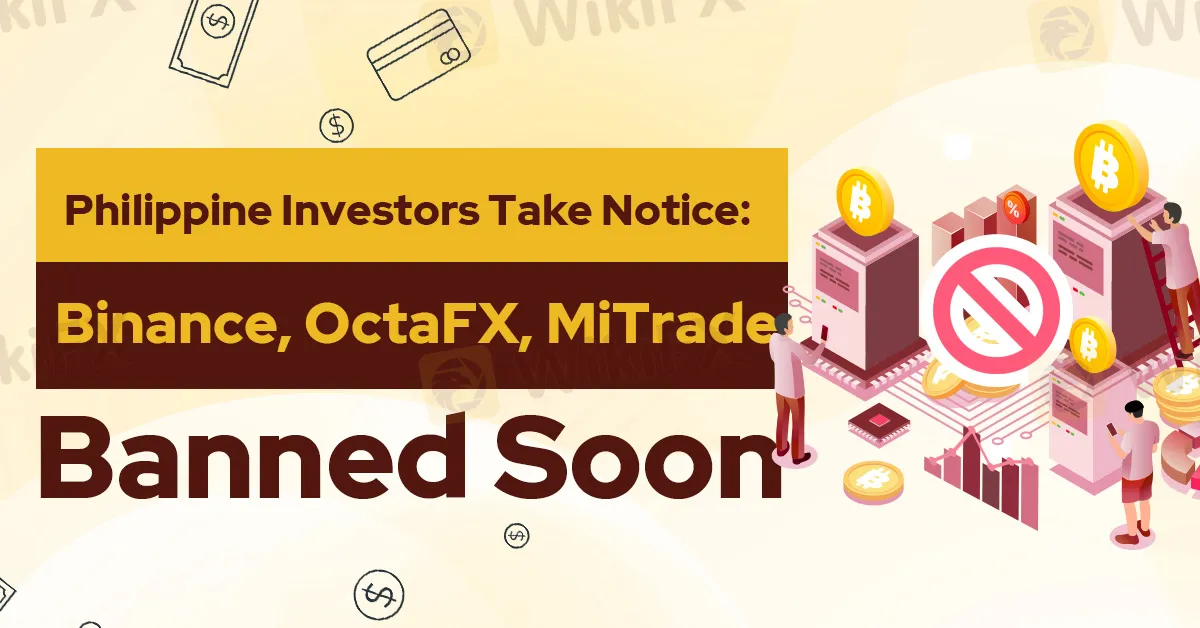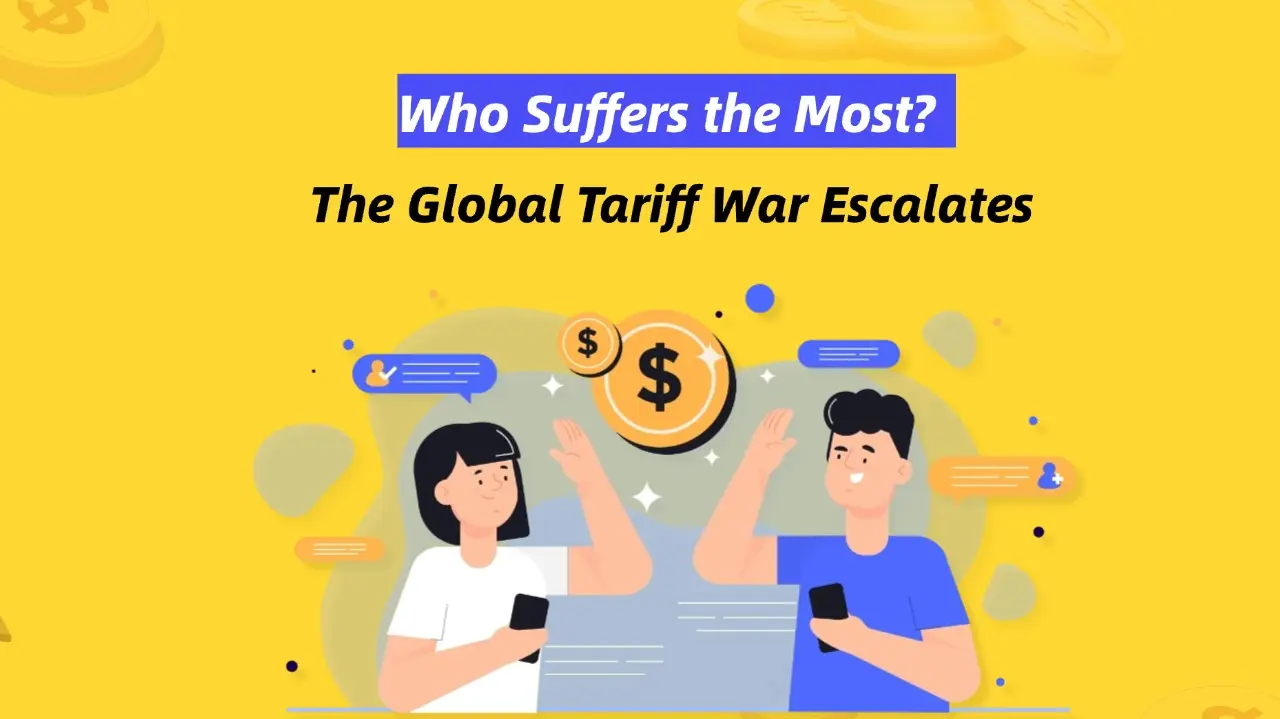简体中文
繁體中文
English
Pусский
日本語
ภาษาไทย
Tiếng Việt
Bahasa Indonesia
Español
हिन्दी
Filippiiniläinen
Français
Deutsch
Português
Türkçe
한국어
العربية
Philippine Investors Take Notice: Binance, OctaFX, MiTrade Banned Soon
Abstract:The Philippines Securities and Exchange Commission, led by Kelvin Lee, has offered clarity on the forthcoming ban affecting Binance, MiTrade, and OctaFX, outlining the timeline and regulatory implications.

The head of the Philippines Securities and Exchange Commission (SEC), Kelvin Lee, has clarified the impending ban on Binance, stating it will come into effect three months after the advisory's issuance.
Scheduled to be enforced within three months of the SEC's advisory release on November 28, the block on Binance in the Philippines allows users time to withdraw their investments from the platform.
Lee provided this clarification during a panel on December 13, aiming to address confusion sparked by the announced ban following Binance's unlicensed operations. The SEC decision stems from regulatory concerns due to Binance's lack of proper registration and authorization within the country.
Highlighting Binance's unauthorized offering of securities in the Philippines under the Securities Regulation Code (SRC) or Republic Act No. 8799, the commission emphasizes its lack of legal authority to conduct such activities.
According to local reports from BitPinas, Lee explained the ban's timeline, initially proposed for as short as one month or even a week. However, to accommodate the Christmas holiday period and minimize inconvenience for Filipino investors, Lee extended the timeframe to three months from the advisory date.
The SEC's actions extend beyond Binance to encompass other unregistered exchanges like OctaFX and MiTrade, facing similar bans within a three-month deadline. The commission is actively monitoring several unregistered exchanges and adopting a “wait-and-see” approach to their compliance post the Binance crackdown.

Addressing criticisms about Binance's cost-effectiveness compared to registered exchanges, Lee points out that Binance's lower costs stem from its non-compliance with local regulations, contrasting them with compliant entities that incur necessary compliance costs.
Lee emphasizes the importance of investing in registered entities for consumer protection, noting the existence of 17 registered virtual asset service providers in the Philippines offering fiat-to-crypto services.
The SEC highlights Binance's active promotion of crypto trading in the Philippines, including via social media, considered an offense under Philippine law.
Furthermore, the SEC's advisory warns that individuals involved as promoters, recruiters, influencers, endorsers, or enablers for Binance in the Philippines, even through online channels, could face criminal liability. Penalties for these offenses could range up to 5 million Philippine Pesos (approximately $90,000) in fines or imprisonment for up to 21 years.
Under Philippine law, entities engaged in buying or selling securities, operating as a broker-dealer, or establishing and managing securities exchanges are mandated to obtain an additional license from the SEC.

Disclaimer:
The views in this article only represent the author's personal views, and do not constitute investment advice on this platform. This platform does not guarantee the accuracy, completeness and timeliness of the information in the article, and will not be liable for any loss caused by the use of or reliance on the information in the article.
Read more

California Cracks Down on Crypto Scams: 42 Websites Shut Down in $6.5M Bust
California Attorney General Rob Bonta announced earlier this week that the state had taken decisive action against fraudulent cryptocurrency operations. Authorities successfully shut down 42 scam websites responsible for deceiving investors out of at least $6.5 million.

Nigeria’s Oil and Gas Sector Gains Momentum
Nigeria’s oil and gas industry is experiencing a surge in investment, fueled by policy reforms and international collaboration, paving the way for continued energy expansion.

The Global Tariff War Escalates: Who Suffers the Most?
The global trade war is intensifying as countries continue to raise tariffs, aiming to protect their own economies while creating greater market uncertainty. In this tit-for-tat game, who is truly bearing the brunt?

Immediate Edge Review 2025: Is it safe?
Launched in 2019, Immediate Edge claims to be an automated cryptocurrency trading platform using AI technology for crypto trading services. The platform requires a minimum deposit of $250 to begin trading, which is relatively expensive for many investors. During its short operation, Immediate Edge failed to establish a positive reputation. The platform has undergone frequent domain changes and has repositioned itself as an intermediary connecting users with investment firms—a move that appears designed to obscure its actual operations. Immediate Edge restricts services to investors from the United States; it remains accessible to users in other regions.
WikiFX Broker
Latest News
Indian Watchdog Approves Coinbase Registration in India
SILEGX: Is This a New Scammer on the Block?
How Can Fintech Help You Make Money?
Good News for Nigeria's Stock Market: Big Gains for Investors!
IIFL Capital Faces SEBI's Regulatory Warning
Why Is OKX Crypto Exchange Under EU Probe After Bybit $1.5B Heist?
Gold Trading Insights: Prepare for Moves Above $2,900 Post-CPI
The ‘Boom-S’ Scam: How a Simple Click Led to RM46,534 in Losses
Royal Forex’s CySEC License Revoked: Can It Still Operate Legally?
Trump vs. Powell: The Showdown That Will Shape Global Markets
Currency Calculator






